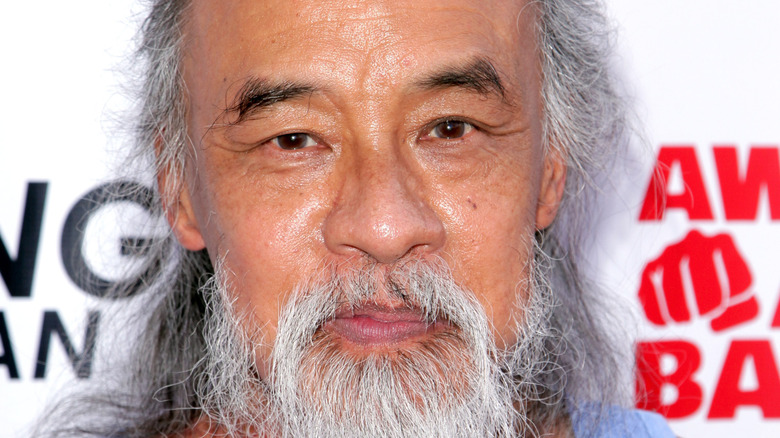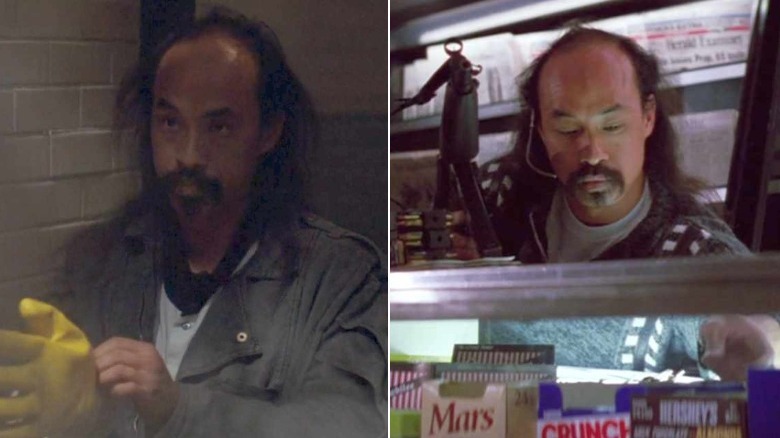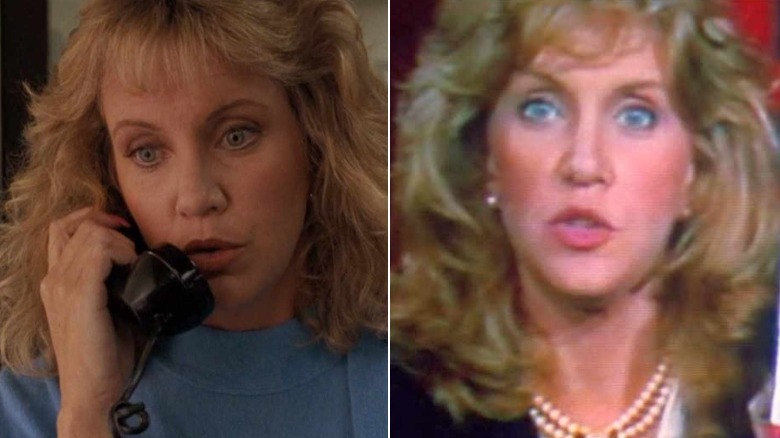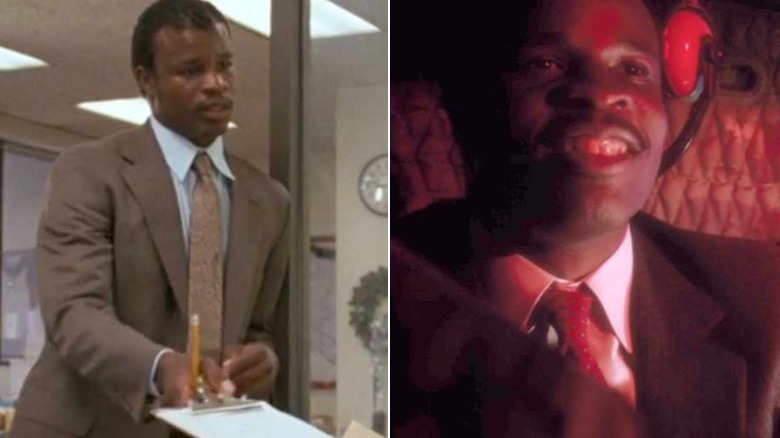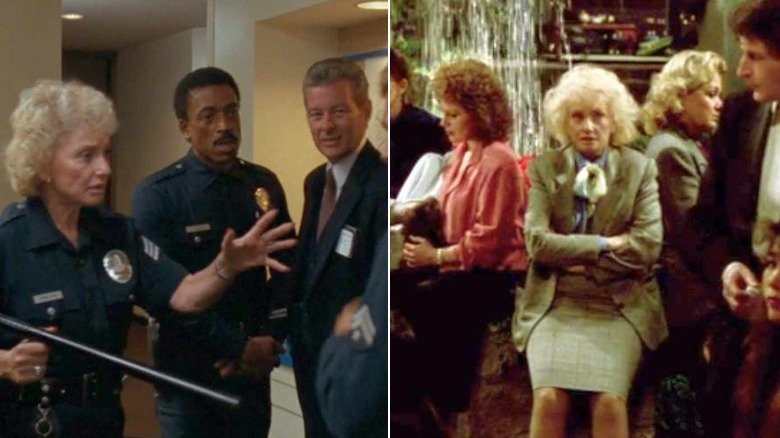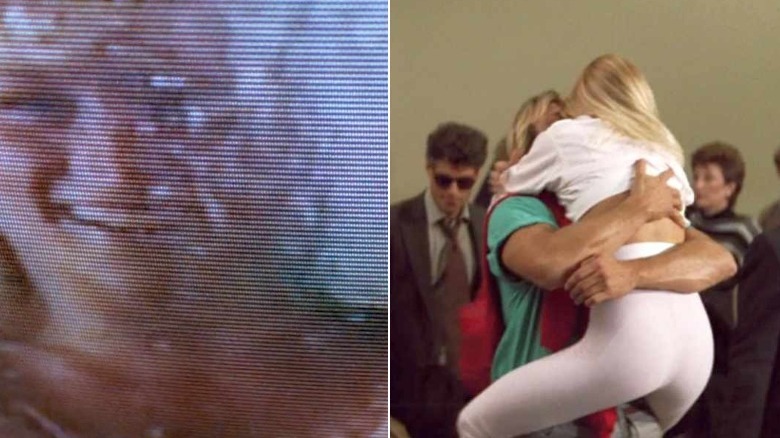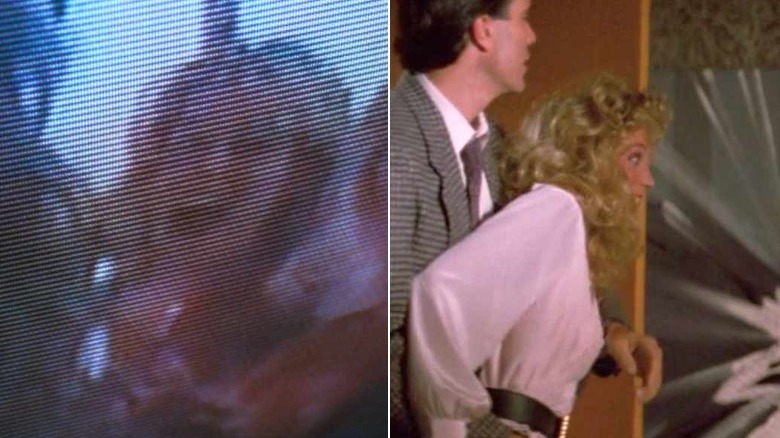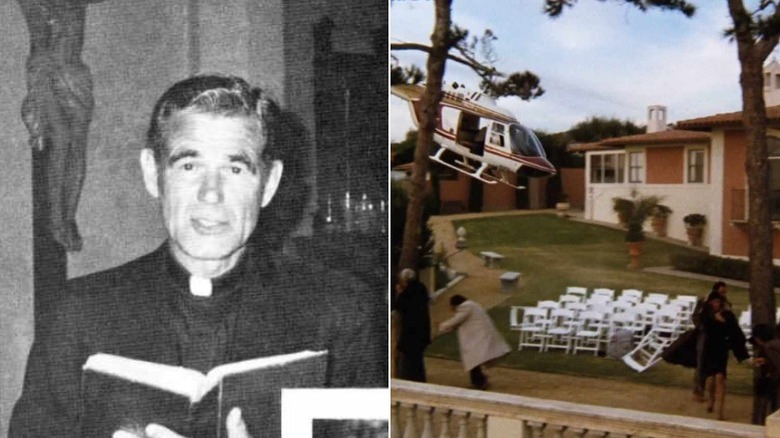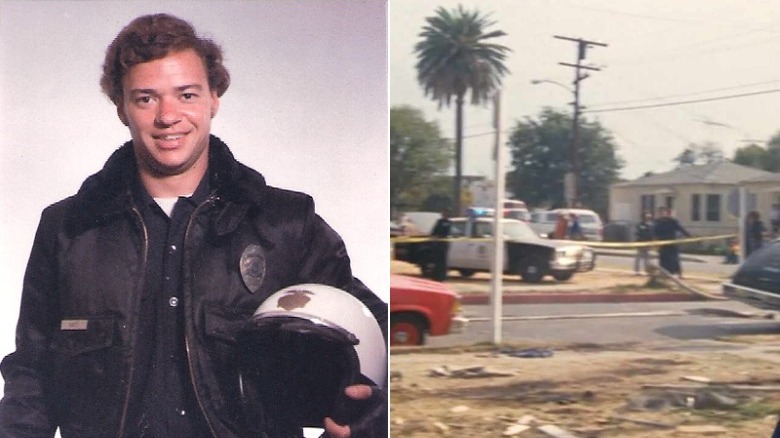Actors Who Appeared In Both Lethal Weapon And Die Hard
1987's Lethal Weapon and 1988's Die Hard share more in common than what can be seen on their explosive surfaces. The Joel Silver produced films ended up being two of the biggest action movies of the 1980s, spawning lucrative franchises that live on via various streaming platforms. Even to this day, it's hard to separate Bruce Willis from his wisecracking New York Detective character John McLane and Mel Gibson from his loose-wired Los Angeles Detective Martin Riggs. The two films stay relevant as we debate such trivial things as do these Christmastime-set titles qualify as "Christmas movies?" Even Willis' mom recently weighed in.
One bond "Lethal Weapon" and "Die Hard" also share is the collaboration of many talented craftspeople that worked on both movies. By IMDB's count, 38 people dedicated themselves to make both of these movies a rousing success. Michael Kamen scored them both, and professionals in the field of make-up, stunts, and even the transportation department assisted to transport us into these action-packed cinematic realities.
Out of those 38 wonderful human beings, 8 were actors, with parts to play that ranged from supporting roles to tiny uncredited ones. Let's take a look at these wonderful actors, 6 of which were officially credited, who appeared in both "Lethal Weapon" and "Die Hard." In some cases, these actors worked with one another on even more movies outside of these two. It's like a six degrees of Kevin Bacon, but way more specific, and perhaps even more fun!
Al Leong
There's one obvious choice for this article that is well known for his brief, but memorable, roles in both "Lethal Weapon" and "Die Hard:" Al Leong. Although Leong is always quick to point out in interviews that he is "a stuntperson, not an actor," who has "broken every rib twice." With his wispy wavy long hair and Fu Manchu mustache, and tendency to be a bad guy, he died many times for his sins in films like "Big Trouble In Little China," although playing Genghis Khan in "Bill & Ted's Excellent Adventure" was "one of the very few films I didn't die in."
Unhappy endings occurred for Leong in "Lethal Weapon," "Die Hard," and the other 1988 Joel Silver film he and Mary Ellen Trainor worked on, "Action Jackson." In "Lethal Weapon," Leong played Endo, a specialist in electric shock torture, who pushes Gibson's Riggs to the limit before he turns the tables and chokes Endo to death with his legs. Leong later had an uncredited role in "Lethal Weapon 4" as a Wah Sing Ku Triad Member.
In "Die Hard," he was the terrorist Uli, who had the sweetest sweet tooth. Leong ad-libbed the memorable scene where he eats a Hershey, then Nestle, and finally a Mars bar while waiting to ambush the SWAT Team. Screenwriter Steven E. de Souza told Empire "that assured him a longer life [in the movie]. He's one of the last guys to die!" Leong still has a fondness for that scene, saying "I loved the candy bars. They were great." He added in a separate interview that the scene lingers in fans' minds because "I guess they don't see bad guys eating candy."
Mary Ellen Trainor
Mary Ellen Trainor is known as many different things to many different fans of movies, be it the mom from "The Goonies," "The Monster Squad," "Roswell," and/or "Parker Lewis Can't Lose," or even perhaps the wife of 20 years to director Robert Zemeckis, who cast her in some of his films, such as "Romancing The Stone" and "Forrest Gump."
From 1987-1988, she pulled double duty in trying to bring order to the chaos of both "Lethal Weapon" and "Die Hard." In "Lethal Weapon" she played a psychologist with no name, but all the backstory info on Martin Riggs and his unstableness. In "Die Hard" she was KFLW-TV news anchor Gail Wallens, who kept the public on high alert with the goings-on at Nakatomi Plaza for Nightline News at 10.
Trainor reprised her role as Wallens, not for another "Die Hard" film, but for a different Joel Silver produced title, which was also written by Steven E. de Souza: 1991's "Ricochet" starring Denzel Washington and John Lithgow. In total, she worked with Silver on 9 projects.
"Lethal Weapon" was her third time working for director Richard Donner after "Scrooged" and "The Goonies," and she would go on to return for three more "Lethal" sequels, finally earning a name, Stephanie Woods, for her long and dedicated service in "Lethal Weapon 3." When interviewed in 2013 about the original film, she said Donner "just created a reality that people could actually, 100% I think identify with."
Trainor died in 2015 of complications from pancreatic cancer.
Grand L. Bush
Shakespearean trained Grand L. Bush has long been giving serious a smile on TV shows like "Good Times, "The Jeffersons," and "Naked Gun" forerunner "Police Squad!, and films such as "Stir Crazy," and the Joel Silver produced films "Streets of Fire" and "Brewster's Millions."
He next signed on for more work with Silver for "Lethal Weapon" playing Detective Boyette. Boyette has the thankless job of informing Danny Glover's Murtaugh that he's about to get a new partner, and also knocked as being "some detective" for not noticing that Murtaugh had shaved his beard. Grand returned for the "Lethal" sequel, but played a different detective by the name of Jerry Collins.
A year later, he and Robert Davi were reporting for duty on "Die Hard" as two unrelated cocky FBI agents with the last name Johnson. Davi was the trigger happy Vietnam vet "Big Johnson," pretending to be in Saigon all over again in the chopper, and Bush was "Little Johnson," who couldn't relate, as he was, during the time of that conflict, "in Junior High." The two macho men would happily re-team for opposite sides in the 1989 Bond film "License To Kill," where Bush noted that Davi was "a bit of a practical joker" on and off set. They shared a call sheet one final time for 1993's "Maniac Cop 3: Badge of Silence."
Bush worked for Silver one last time for 1993's "Demolition Man" with an uncredited role, and played Balrog in "Die Hard" screenwriter Steven E. de Souza's directorial debut, 1994's "Street Fighter."
Selma Archerd
With over 50 credits to her name, spread out over almost 3 decades, Selma Archerd supported casts as diverse as The Bradys (on the original TV show, the 80s Christmas movie, and the 90s parody film), The Village People, "Mommie Dearest," "Cagney & Lacey," and "Melrose Place."
Archerd also was on the right side of the law as a "policewoman" nudging her fellow policemen to sing "Silent Night" in "Lethal Weapon." She resurfaced in "Lethal Weapon 3," and was promoted and credited with a name: "Officer Selma." In "Die Hard," as an employee of the Nakatomi Corporation, she is in need of help from the law after she and her fellow coworkers become hostages. In the same year as "Die Hard," she worked with Dick Donner and Mary Ellen Trainor in "Scrooged."
Archerd worked in the movie industry, and her husband, an "honorable man and a damned good journalist," Army Archerd, wrote about the business for Variety. The couple was ever-present on the Hollywood scene (once involved in a chaotic, bloody brawl at a Gucci fashion show), and even appeared as themselves on an episode of "The Love Boat." Selma had previously appeared in 3 different "Love Boat" voyages, but didn't play herself.
Army passed in 2009, and Selma will celebrate her 97th birthday in 2022.
Terri Lynn Doss
Terri Lynn Doss landed her first movie role in "Lethal Weapon" as one of Amanda Hunsaker's soapy "friends." "Girl in Shower #2" was a bit part filmed at Richard Donner's house, which was seen in the movie on a revealing VHS tape reviewed by distraught Detective Murtaugh. Sadly, most of her role ended up on the cutting floor.
July 1988 was a mammoth month for Doss, being named Playboy's Playmate of the Month, and Joel Silver recruiting her again as "female eye candy" for "Die Hard." She played an overly excited, spandexed woman, who jumps into the arms of her lover at the airport John McClane just arrived at. Her sunny enthusiasm brings McClane to a smile, and knowingly utter "California." According to London People, Doss also helped to keep Willis in shape on set, and said, "if he hadn't been so obviously devoted to Demi [Moore], I could have fancied him myself." That same year, Doss moonlighted with Willis on an episode of "Moonlighting" (one of her favorite TV shows at the time).
The 1989 Joel Silver produced "Road House" was to be her biggest role to date. However, she was "pretty much cut out of the entire film after a stint I would not partake in, let's say, a 'casting couch.'" That event left her "wanting MORE... more for myself as a human being," and she left the business when she realized "that my calling in life was to become a mother." She did continue to make modeling appearances in the years that followed, many of which played up the fact that she was in both "Lethal Weapon" and "Die Hard."
Cheryl Baker
Cheryl Baker (not that Cheryl Baker) also took part in the Joel Silver film trifecta from 1987-1989, "Lethal Weapon," "Die Hard," and "Road House." In "Lethal Weapon," she joined fellow trifecta alum Terri Lynn Doss in the shower as a friend of Amanda. In "Die Hard," she was just as frisky, as "woman," a Nakatomi worker who enjoys a good romp on an office desk, and has her passionate moment with a coworker violently interrupted by the terrorists during the holiday party.
Baker only got things cooking in 5 films in total, but steamed up each one she graced. For "Road House" she was the "Well-Endowed Wife," whose husband let others have a feel for talents. Her final known film role was in 1991's "L.A. Story," where Steve Martin inadvertently catches a peek of her bare necessities while trying on clothes in a store's changing room. Baker also appeared on a 1992 episode of "The Howard Stern Show," not so ironically with adult film star Letha Weapons. She has not resurfaced in popular culture since then.
Bob Harks
When Bob Harks was a student at the University of Wisconsin, he was praised for his looks and voice, but was labeled as "not much of an actor." That did not stop him from pursuing his dream, as he eventually racked up well over 500 credits in the film and TV industry. His name and face may not be familiar, as he was mainly standing in the background or even being a stand-in for the likes of John Forsythe, Robert Wagner, James Brolin, Burt Reynolds, and Bill Bixby (75 times for "The Incredible Hulk"!).
Harks played a priest 21 times, with two of those times being barely seen in the background of "Lethal Weapon" (at the funeral on the bluff shootout scene) and "Die Hard" (as one "in terminal"). Harks had a large collaboration tally with Selma Archerd (above), co-starring previously in films such as 1977's "Fun with Dick and Jane" and "New York, New York." He also pitched in for two other Joel Silver films, "48 Hrs." and "Brewster's Millions" (along with Grand L. Bush), and worked with Danny Glover on a 1981 episode of "Hill Street Blues." In a bit of a role reversal, he had a credited part in "Forrest Gump," while Mary Ellen Trainor and Grand L. Bush had uncredited ones.
When Harks passed away peacefully in his home at age 83, in 2010, his brief obituary didn't even make note of his prolific Hollywood resume. Thank you for your long service, Mr. Harks.
Conrad Hurtt
Like Bob Harks, Conrad Hurtt had a lengthy career in film and television playing supporting and minor roles. According to IMDb, the two actually shared credits (or uncredits) on 14 projects, starting with 1985's "Fletch" and culminating with 1990's "Postcards from the Edge," with both "Lethal Weapon" and "Die Hard" in-between.
When we reached out to Mr. Hurtt to ask him about being in both "Lethal Weapon" and "Die Hard," he admitted that he suited up to play a SWAT team member for "Die Hard," and stayed "up all night long waiting for my chance to be in the film. Unfortunately they never needed me." Still, he was hired to work on the film, was there when they filmed, but just never made it into the finished project.
However, Hurtt was in the first two "Lethal Weapon" movies, playing a police officer in each. In the first one, he kept passersby safely away from the Dixie's house blast site, and in the second one, hung out in the squad room, where he watched Gibson, Joe Pesci and Dick Donner work their magic. He said "they were all laughing so much, they had to retake so many times – I thought we would never be done."
Hurtt added, "Many of us had our own police uniforms, so when we were needed in a squad room or on location we would come dressed ahead of time."
